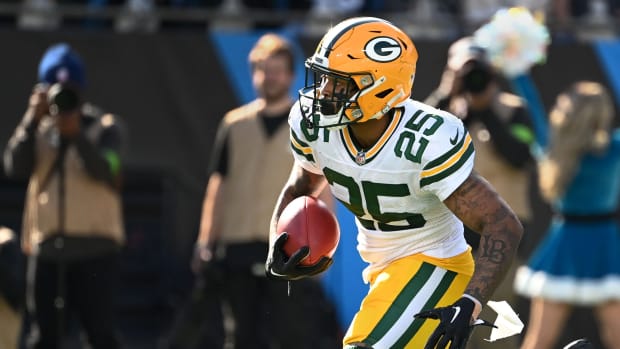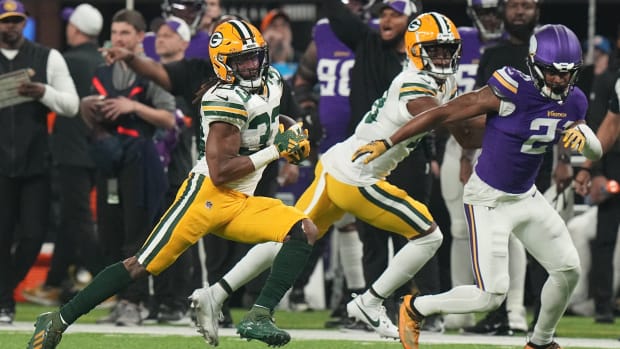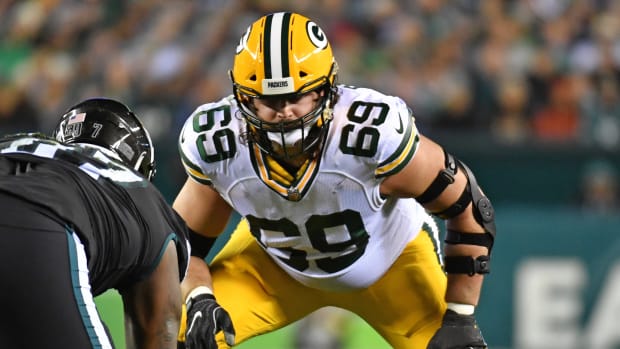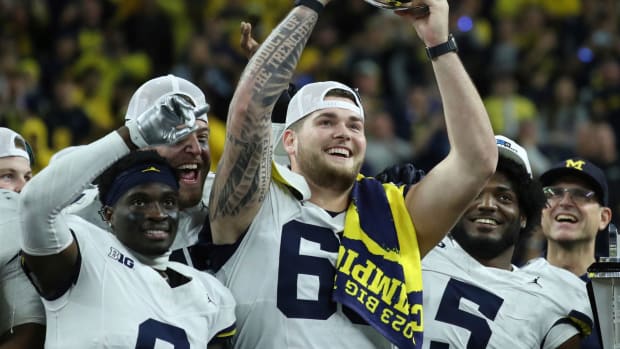Packers Aren’t Super No. 1: Dangerously Explosive
Note: With an 8-2 record at the bye, the Green Bay Packers are a prime contender to be playing in Super Bowl LIV on Feb. 2 in Miami. This is part of a six-part series – three on why the Packers will get to the Super Bowl and three on why they will fall short.
The Green Bay Packers have a big problem.
Specifically, it’s a big-play problem.
The NFL’s best teams either create a bunch of big plays or they prevent the opponent from creating big plays. The elite teams tend to excel in both areas.
The Packers are in first place in the NFC North and have a chance to take over first place in the NFC overall with a win at San Francisco after the bye. They’ve put themselves in that lofty position despite their big-play issues.
Offensively, despite the presence of Aaron Rodgers and his ability to turn nothing into something, the Packers have produced 39 plays of 20-plus yards. That’s a ho-hum 13th in the league. Defensively, the Packers have allowed 42 plays of 20-plus yards. Only seven teams have allowed more.
Added together, Green Bay is minus-3 in 20-yard plays – our arbitrary definition of a big play. It’s the only team in the league with more than five wins while being even or worse in 20-yard plays.
The offense’s problems are easy to pinpoint. Green Bay’s best receiver, Davante Adams, missed four games with turf toe and didn’t make any impact plays in his first game back. With no other receivers consistently able to pick up the slack, the passing game simply lacks firepower. While Marquez Valdes-Scantling is tied for the NFL lead with six receptions of 40-plus yards, he has just one catch for 4 yards the last three games.
The defense’s problems are maddening. Outside linebackers Preston Smith (10 sacks) and Za’Darius Smith (8.5 sacks) are having huge seasons, inside linebacker Blake Martinez leads the NFL in tackles and cornerbacks Jaire Alexander and Kevin King have been superb at times. However, Mike Pettine’s defense has been gashed for far too many big plays. More than 37 percent of Green Bay’s yardage total has come on the 42 big plays. Put another way, opponents are averaging 4.05 yards per play once those long gains are taken out of the equation. Instead, it ranks 28th with 6.03 yards allowed per play.
“With the smoke clearing and us being at 8-2, we certainly feel good knowing that we can be a lot better,” defensive coordinator Mike Pettine said. “That’s the encouraging thing and that’s the message we left the guys with, that we’re close but a lot of times a guy will be focused for 98 percent of the game and then those few snaps that he’s not, we end up giving up a big play. I just think it’s encouraging for us to know where we are from a wins standpoint and a lot of the issues that we’ve had are stuff that we can control. That’s why the optimism moving forward that, ‘Hey, we’re going to get it corrected and hopefully make a run.’”
20-yard plays
New England: 42 on offense, 22 on defense. Net: 20. Record: 8-1.
L.A. Rams: 43 on offense, 24 on defense. Net: 19. Record: 5-4.
Dallas: 44 on offense, 29 on defense. Net: 15. Record: 5-4.
San Francisco: 38 on offense, 23 on defense. Net: 15. Record: 8-1.
Kansas City: 52 on offense, 38 on defense. Net: 14. Record: 6-4.
Minnesota: 49 on offense, 37 on defense. Net: 12. Record: 7-3.
Buffalo: 38 on offense, 27 on defense. Net: 11. Record: 6-3.
L.A. Chargers: 42 on offense, 32 on defense. Net: 10. Record: 4-6.
Denver: 34 on offense, 24 on defense. Net: 10. Record: 3-6.
Baltimore: 41 on offense, 36 on defense. Net: 5. Record: 7-2.
Jacksonville: 44 on offense, 39 on defense. Net: 5. Record: 4-5.
Seattle: 47 on offense, 42 on defense. Net: 5. Record: 8-2.
Cleveland: 38 on offense, 35 on defense. Net: 3. Record: 3-6.
Houston: 40 on offense, 39 on defense. Net: 1. Record: 6-3.
New Orleans: 32 on offense, 31 on defense. Net: 1. Record: 7-2.
Chicago: 24 on offense, 24 on defense. Net: Even. Record: 4-5.
Detroit: 45 on offense, 45 on defense. Net: Even. Record: 3-5-1.
Indianapolis: 32 on offense, 32 on defense. Net: Even. Record: 5-4.
Philadelphia: 30 on offense, 30 on defense. Net: Even. Record: 5-4.
Atlanta: 37 on offense, 38 on defense. Net: -1. Record: 2-7.
Tennessee: 37 on offense, 38 on defense. Net: -1. Record: 5-5.
Pittsburgh: 28 on offense, 30 on defense. Net: -2. Record: 5-4.
Green Bay: 39 on offense, 42 on defense. Net: -3. Record: 8-2.
Tampa Bay: 38 on offense, 41 on defense. Net: -3. Record: 3-6.
Arizona: 43 on offense, 49 on defense. Net: -6. Record: 3-6-1.
Carolina: 30 on offense, 43 on defense. Net: -13. Record: 5-4.
N.Y. Giants: 35 on offense, 50 on defense. Net: -15. Record: 2-8.
N.Y. Jets: 20 on offense, 37 on defense. Net: -17. Record: 2-7.
Washington: 21 on offense, 38 on defense. Net: -17. Record: 1-8
Oakland: 34 on offense, 53 on defense. Net: -19. Record: 5-4
Cincinnati: 32 on offense, 56 on defense. Net: -24. Record: 0-9.
Miami: 19 on offense, 44 on defense. Net: -25. Record: 2-7.




